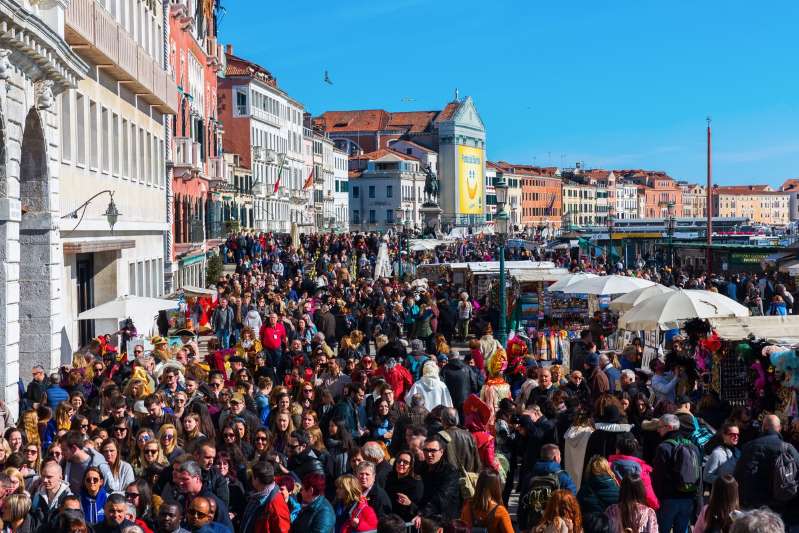Why tourist taxes will never solve the problem of overtourism ?

- Justin Francis
Destinations around the world are raising more tourist taxes than a medieval king preparing for war, and predictably, it’s causing controversy.
I’m of the opinion that taxes are more than justified.
The tourism industry has consistently failed to acknowledge that it has a responsibility to destinations and their residents, as well as travelers.
It’s a controversial approach, not without its flaws and certainly not a solution in itself. But this tactic is entirely justified and a direct result of the overtourism phenomenon.
The industry has only itself to blame.
Edinburgh has become the first British city to pass a tourism tax, proposed at £2 ($2.50) per room and capped at seven consecutive nights, with some 90 percent of residents thought to be supportive of the idea. At the time of writing, some two-thirds of EU member states impose a form of occupancy tax on tourists. This year we will see the introduction of taxes in Venice and tax for cruise passengers in Amsterdam, while Bath and Bristol are among other British cities mulling the idea. But while topical, tourist taxes are nothing new. In fact the idea dates to at least the early 16th century.
The theory is that a tax on visitors can raise funds to offset some of the negative impacts of tourism. People who live in over-popular destinations suffer from crowding on the streets and public transport (that their own taxes pay for); steeply rising rents, and higher prices in local shops and restaurants; noise and antisocial behaviour; and increased strain on everything from waste removal services to water supply. No wonder that “anti-tourist” campaigns such as that recently seen in Barcelona are becoming more vocal.
Taxes are relatively easy to collect, and they can be adjusted fairly to reflect the net benefits of different types of traveler. For instance, as the cruise industry demonstrably results in severe overcrowding and less local spending, it’s surely only fair that cruise passengers should be taxed more. Further, making both residents and visitors clearly aware of exactly how the money is being spent to offset the impacts of tourism should make people come around to the idea. A good example is Bali, where a proposed tourist tax is specifically targeted at pollution and waste management on the island.
The tourism industry has historically been regarded as essentially benign, but there is a growing realization that this is rarely the case, that tourism is in fact freeloading – making money from places, communities, and the environment – without contributing to sustaining them. Many tourists and the companies they book with fail to appreciate that we are holidaying in someone else’s home. I feel that the price of a holiday rarely reflects the true cost to the destination itself.
Now, of course, it can be and is argued that tourism boosts employment and infrastructure. In my view that’s a fallacy. Tourism cannot operate without jobs, airports and roads – it needs them just as much as local residents. To say that these are munificent gifts from tourism doesn’t negate the fact that the industry has a wider responsibility for sustaining the places it markets for profit.
But will imposing taxes solve the problem? I don’t think so. If someone is considering the expense of buying a holiday, a small extra cost is unlikely to deter them. Perhaps it may dampen demand slightly, but when the tax is under €5($5.67) per night in some European cities, I doubt it will have much impact.
Taxes in themselves do nothing to help with the core issue of sustainability. When planning for tourism, governments and tourism chiefs too often fail to identify the negatives as well as the positives. The perception tends to be that the more tourists, the better, which as we see in cities such as Venice, Dubrovnik and Barcelona, is not necessarily true.
I can’t think of a situation where taxation alone will solve all of the problems that tourism creates. There are better, more effective ways to ensure a destination gets the types of visitors it needs and manages them well:
A clear focus on the type of tourist and market that best suits the destination.
Proper visitor management, including adequate public transport systems. For attractions, pre-booked tickets, timed entry, seasonal or intraday pricing are some tactics that can make a positive difference.
If visitor numbers are too high, then tightening up cruise ship numbers, hotel and Airbnb rooms and flights, and cutting back on destination marketing, can all be effective.
Responsible diversification of the tourism offer to spread the benefits more widely, and reduce pressure on the honeypot sites, but without simply shifting the problem somewhere else.
Fundamental to all of this are two essentials. Firstly, ensuring that local residents have a stake in what type of tourism is developed, where and how; and secondly, that environmental impacts are also considered in planning.
As I write about limiting tourism numbers and pricing people out I can already hear the cries of “elitism”, and I would answer them in the same way I always have. People perceive travel as a right. But our right to travel does not trump those of local residents, and neither should it outweigh the needs of the environment. Secondly, approaches such as making attractions bookable in advance, with fixed numbers, don’t penalize those who are less well off. They penalize those who just expect to turn up on the day and be given access.
Raising taxes is a natural consequence for an industry that hasn’t paid its way. I think it’s entirely legitimate and I think we’re only going to see more of it.
Justin Francis is the CEO of sustainable tourism company Responsible Travel.
Courtesy : The Independent / Feb. 2019














